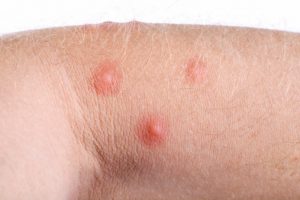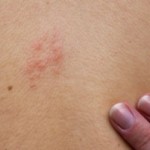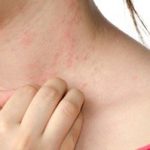 Hives are a reaction of the skin that can be red and quite itchy. There are two types of hives: short-lived (acute) and long-term (chronic). Chronic hives are when the redness and welts last for numerous weeks and come back over the course of months and even years. Although chronic hives are not a life-threatening condition, they can be irritating, uncomfortable and affect a person’s self-esteem if noticeable.
Hives are a reaction of the skin that can be red and quite itchy. There are two types of hives: short-lived (acute) and long-term (chronic). Chronic hives are when the redness and welts last for numerous weeks and come back over the course of months and even years. Although chronic hives are not a life-threatening condition, they can be irritating, uncomfortable and affect a person’s self-esteem if noticeable.
Hives triggers and symptoms
The main symptoms of hives are redness and itchiness and generally look like a skin rash. Hives can appear anywhere on the body, and they can range in size from a few millimeters to the size of a hand. In short-lasting hives, the rash appears and goes away but in chronic hives, it can last for much longer and come back time and time again.
Advertisement
Hives are not just a random event and are often triggered by something. Common triggers include:
- Foods – peanuts, shellfish, eggs
- Medications
- Insect stings or bites
- Physical stimuli – cold, heat, sun exposure
- Latex
- Blood transfusions
- Bacterial infections
- Viral infections
- Pet dander
- Pollen
- Some plants – poison ivy
Causes of acute and chronic hives
Causes of acute hives include:
- Food allergy
- Allergic reaction to environmental factors
- Allergy to latex
- Infections
- Insect bites and stings
- Emotional stress
- Certain medications
- Temperature, sun exposure
Chronic hives causes are:
- Rheumatoid arthritis
- Lupus
- Autoimmune disease
- Stress
- Alcohol
- Caffeine
- Warm temperatures
- Prolonged pressure on the skin – wearing tight clothing
- Medications
- Certain food additives
- Insect bites or stings
Is it hives or angioedema?
Angioedema is similar to hives in the sense that they are both skin conditions, but instead of swelling occurring on top of the skin, angioedema occurs below the skin. In angioedema, deep swelling can occur that affects the eyes, lips, genitals, hands and feet. Although angioedema can last longer than hives, it usually goes away after 24 hours.
Both hives and angioedema are caused by a release of histamines in the body, which become triggered by allergies, chemicals or environmental factors.
If you’re unsure which condition you have, the symptoms you are experiencing can help you determine between the two, but you can talk to an allergist to be sure.
Home remedies for hives
If you’re looking to manage and control hives at home, here are some home remedies to try that can offer relief from symptoms.
- Identify and avoid triggers.
- Take an over-the-counter antihistamine.
- Apply cool, wet compresses.
- Take a cool bath.
- Wear loose, breathable clothing.
- Apply baking soda to relieve itching.
- Soak in apple cider vinegar and water mixture or drink apple cider vinegar in water.
- Soak in or apply oatmeal to the affected area.
- Apply a mixture of water and basil to the affected area.
A study has found that vitamin D may offer relief to those living with chronic hives (urticaria).
Vitamin D provides relief for those with chronic hives: Study
A previous study found that vitamin D, when given to patients with chronic hives, can offer relief. The study examined the role of vitamin D3 in chronic hives as the researchers gave participants a supplement form of the vitamin.
The study lasted for 12 weeks and 38 participants took a triple-formula of allergy medicines along with vitamin D3. Half of the participants took 600 IU of vitamin D3 and the other half took 4,000 IU.
After only one week, 33 percent of participants began experiencing relief from symptoms. At the end of the 12 weeks, the group taking the larger amount of vitamin D3 had reduced symptoms associated with chronic hives by 40 percent. In the 600 IU group, relief did not change after the primary week of treatment.
Researcher, Jill Poole, M.D., said, “We consider the results in patients a significant improvement. This higher dosing of readily available vitamin D3 shows promise without adverse effects. Vitamin D3 could be considered a safe and potentially beneficial therapy.”
“It was not a cure, but it showed benefit when added to anti-allergy medications. Patients taking the higher dose had less severe hives – they didn’t have as many hives and had a decrease in the number of days a week they had hives. Standard therapy is to control symptoms with antihistamines and other allergy medications. Some are costly and can pose substantial side effects,” Dr. Poole concluded.
 Treating acute and chronic hives
Treating acute and chronic hives
For acute hives, taking an antihistamine can usually reduce the longevity of the hives. Generally, you can use an over-the-counter variety or, if severe, you can speak with your doctor for a prescription version. A doctor may also prescribe corticosteroids for temporary relief of acute hives.
Chronic hives, too, may be treated with antihistamines and corticosteroids. A menthol cream may also be useful to reduce itchiness and to apply during flare-ups. Narrowband UVB phototherapy is another treatment for chronic hives, which shines high-energy ultra-violet light onto the area. Although effective, it may require numerous treatments before symptoms improve significantly.
Other medications for chronic hives include leukotriene receptor antagonists, ciclosporin and omalizumab.
Diet can also play a role in hives, especially if food additives are a trigger for you. Identifying foods allergies and additives that trigger hives and avoiding them is an easy way to better manage the appearance of hives.
With the help of your doctor, along with home remedies, you can better manage acute and chronic hives and reduce flare-ups.
Related Reading:
Get tested to confirm aspirin allergy
Daily aspirin is often used to prevent cardiovascular events, but many people have been told to stop after showing signs of an allergic reaction. New findings suggest that although many patients have been told to stop taking aspirin due to a one-time reaction, no tests were conducted to confirm diagnosis; thus many of them were taken off effective treatment without just cause. Continue reading…
Advertisement
Oral allergy syndrome: Causes and symptoms
Most of us are familiar with allergy season, that time of year when pollen irritates the noses of certain people. It triggers sneezing, coughing, a runny nose, itchy eyes and in some cases headaches. These are what you would call “typical” symptoms, but have you ever heard anyone complain about having an itchy mouth? Continue reading…
Sources:
http://www.mayoclinic.org/diseases-conditions/chronic-hives/basics/definition/con-20031634
http://www.sciencedaily.com/releases/2014/02/140217084804.htm
http://www.nhs.uk/Conditions/Nettle-rash/Pages/Symptoms.aspx
http://acaai.org/allergies/types/skin-allergies/hives-urticaria
http://www.nhs.uk/Conditions/Nettle-rash/Pages/Causes.aspx
http://www.webmd.com/skin-problems-and-treatments/guide/hives-urticaria-angioedema
http://thyroiddiseaseawareness.weebly.com/hives.html
http://www.top10homeremedies.com/home-remedies/home-remedies-hives.html/3
http://www.nhs.uk/Conditions/Nettle-rash/Pages/Treatment.aspx
